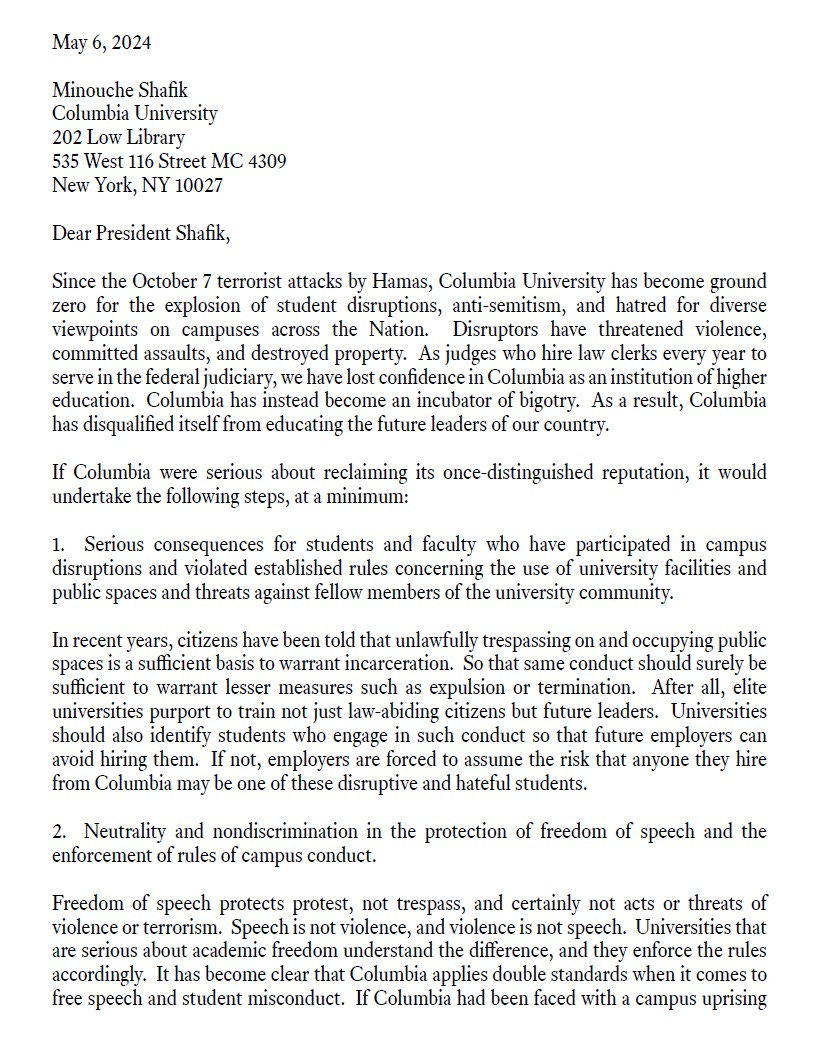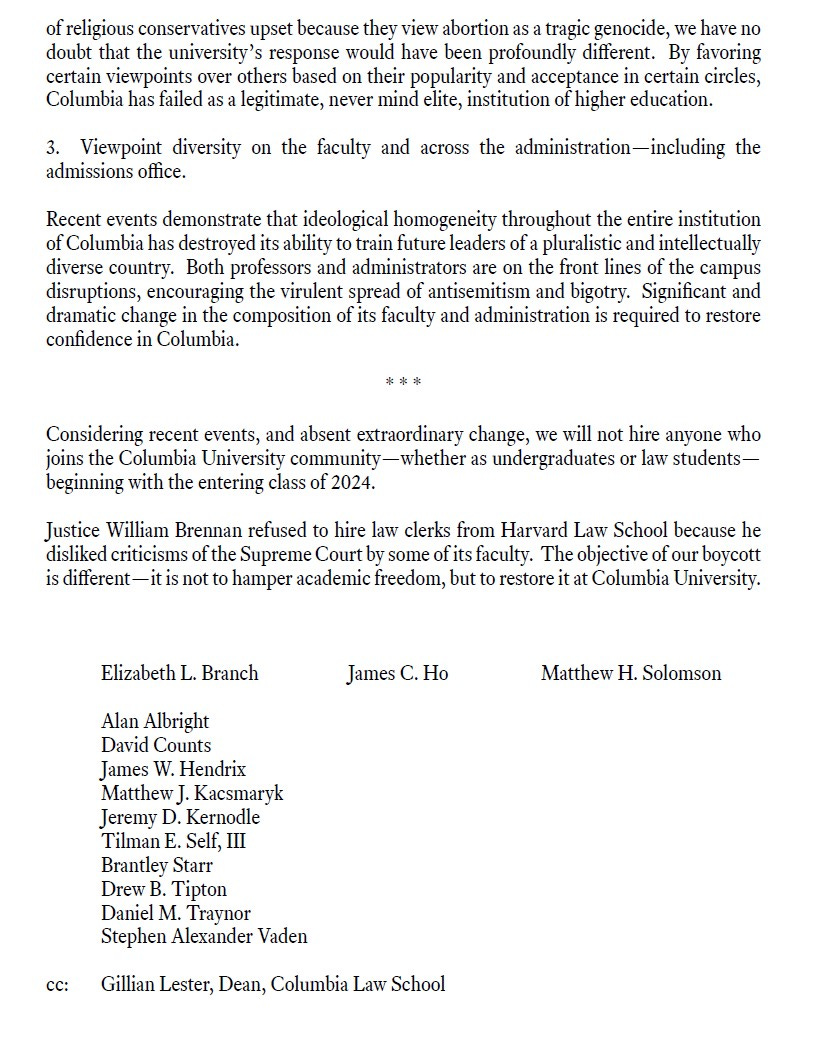Why Some Federal Judges Refuse to Hire Law Clerks from Columbia
A letter and a Wall Street Journal column explain why 13 federal judges announced a hiring boycott of Columbia University students
On May 6, 2024, a group of 13 federal judges sent a letter to Columbia University President Minouche Shafik declaring that starting with 2024’s entering class they will not hire law clerks who are Columbia undergraduates or law students.
The Text Matters, Again
The actual text of a communication is often revealing in more ways than may have been intended. The judges’ letter, and a Wall Street Journal column by one of them, shows them not just expressing general disapproval of Columbia’s handling of recent campus protests. Rather, the judges are enforcing a moral judgment through a boycott.
Here is the letter:
A column, Why I Won’t Hire Law Clerks from Columbia, by U.S. Court of Federal Claims Judge Matthew Solomson in the May 9 edition of The Wall Street Journal also illuminates the thinking of the 13 judges. [1] The column can be read
The Judges’ Concerns About Columbia
Each judge who signed the letter could serve their remaining term on the bench without hiring a law clerk from Columbia, or other law schools, without attracting much notice. What seems to matter more than what the judges plan to do is their joint public declaration, through the letter, that they will do it. There is something suspect when the announcement of an act is more important that the act itself—the overused word “performative” comes to mind.
The judges’ letter asserts that Columbia can reclaim “its once-distinguished reputation” (which might lead to the lifting of the boycott, although this is not stated in the letter) by making changes on three fronts. The judges want Columbia to impose “[S]erious consequences for students and faculty who have participated in campus disruptions” and to insure“ [N]eutrality and nondiscrimination” in protecting free speech and enforcing campus rules and to implement “viewpoint diversity” in the faculty, administration and admissions office.
The heart of the judges’ argument is that Columbia maintains a double standard about free speech and student conduct. They claim:
If Columbia had been faced with a campus uprising of religious conservatives because they view abortion as a tragic genocide, we have no doubt that the university’s response would have been profoundly different.
Of course, the national debate over abortion access is far from settled. However, Columbia’s imagined response to a hypothetical campus-wide Right-to-Life protest is an odd way to show that the university maintains a double standard about the protests focused on Gaza, Israel, and the Jewish people.
The judges reach across the ideological divide to support their boycott. The last paragraph of the judges’ letter aligns their boycott with the hiring practices of liberal Supreme Court Justice William Brennan who reportedly declined to hire law clerks from Harvard Law School because he disliked Harvard faculty members’ criticisms of the Court. The 13 judges claim a higher purpose than Justice Brennan: their boycott is designed to restore academic freedom at Columbia.
The Judges’ Ruling and the Effectiveness of Their Remedy
The judges are not reticent about issuing a ruling: their letter calls Columbia “an incubator of bigotry.” However, a judicial ruling is different from a remedy. Judge Solomson’s column explains the use of a boycott as a remedy:
The purpose of any boycott is to change the behavior of the target. To be effective., a boycott must rally a critical mass of the target’s customers. Hardly anyone thinks Columbia’s behavior is acceptable. The only question is whether we are being so overinclusive that we will punish the wrong people. I had this concern but ultimately decided that it is a criticism of boycotts per se, not of this particular one.
How the judges’ boycott will “rally a critical mass of the target’s customers” is unclear. Are the “target’s customers” Columbia students? If so, the judges seem to expect that Columbia students who are being denied what Judge Solomson refers to as “prestigious clerkship slots” will pressure the university to reform as dictated by the judges.
Judge Solomson’s statement that punishing the wrong people “is a criticism of boycotts per se, not of this particular one” is puzzling. What if there are highly qualified Columbia students who would be outstanding law clerks for one or more of the 13 judges? In that instance, doesn’t the boycott result in everyone losing, including the judges?
If each of the 13 judges hires two law clerks, the boycott makes 26 potential clerkships unavailable to Columbia students every year. There are 890 Article III judges, so the 13 judges are a little over 1% of the federal judges who hire law clerks. [2] Accordingly, the scope of the boycott appears limited, at least for now.
Hiring Priority: Institutional Reputation or Individual Ability?
Judge Solomson observes:
Every elite university asks employers to make collective judgments about their alumni. Graduates of Columbia have been viewed as among the most capable young people in the country. Recent events have made clear that Columbia deserves a very different reputation.
There is a difference between Columbia’s institutional standing and the abilities and character of its graduates. It may just be the column’s loose language, but it seems to say that employers hire primarily on the basis of brand (or “collective judgments” about an institution’s reputation) rather than on the individual merits of job-seekers. The irony is that conservatives, like the 13 judges, frequently criticize the establishment in various forms—political, media, legal, etc.—as too deferential to the reputations of elite institutions like Columbia.
Good (the Judges) Versus Evil (Columbia)
Judge Solomson’s column ends this way:
I don’t begrudge judges who choose not to join us in this effort, but I continue to believe that we who have chosen to boycott are justified in using the tools at our disposal—prestigious clerkship slots—as a force for good.
Thus, the judges’ boycott of Columbia students is ultimately a moral choice. The 13 judges claim a moral justification for their boycott—“a force for good”— which they will use to smite the sinful Columbia.
The next time conservatives complain about “activist judges” someone might note that at least 13 members of the federal judiciary are prepared to rule on moral, not legal, questions and to use their positions as judges to enforce their moral judgments. This behavior suggests a theocracy, or at least a role well beyond that intended for the judiciary in the American system of government.
Whether Columbia’s reputation is irrevocably tarnished by the recent campus protests, as some people believed it was after 1968’s protests, remains to be seen. [3] The soundness of the reasons for the judges’ boycott of Columbia students, and the effectiveness of the boycott, are also open to serious question.
Your comments are very welcome.
(1) As a 1975 graduate of Columbia Law School, I thought at first that my chance to clerk for any of the 13 judges might be gone. However, there may still be hope. The judges’ letter says that their boycott will operate prospectively. It applies to “anyone who joins the Columbia University community—whether as undergraduates or law students—beginning with the entering class of 2024.”
(2) See USCourts.gov. The judges provided no information on how many Columbia graduates they have hired as clerks in the past, or how many Columbia graduates have applied to be their clerks. Accordingly, there is no historical data that suggests the future impact of their boycott.
(3) Many of those who lived through the turmoil at Columbia in 1968 saw its law school students and faculty as moderating and stabilizing influences.





